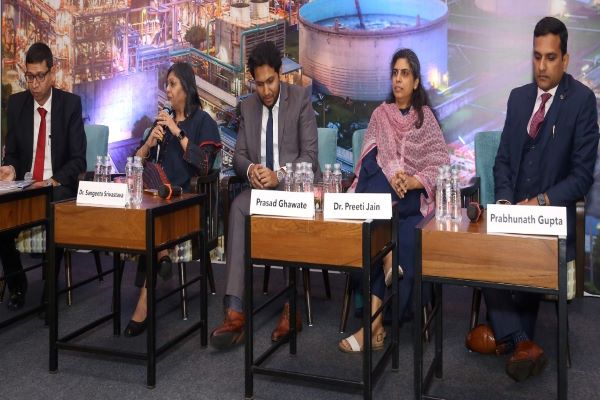Incentives for innovation and R&D to develop new technologies will pave the way for cost effective bio-based solutions

Bio-based products can make the economy more sustainable and lower its dependence on fossil fuels. By using fermentation and bio-catalysis instead of traditional chemical synthesis, higher process efficiency can be obtained, resulting in a decrease in energy and water consumption, and a reduction of toxic waste.
In this context, the industry experts recently discussed the latest trends at the fourteenth session, ‘Bio-based Solutions for Energy and New Chemicals Transition’ of NextGen Chemical and Petrochemical Summit 2023 organized in Mumbai by the Indian Chemical News on July 13-14, 2023. The session was moderated by Pravin Prashant, Editor, Indian Chemical News
Bio-based solutions bring in sustainability and circularity in totality, believes Dr. Sangeeta Srivastava, Executive Director, Godavari Biorefineries who stressed on the need for bio-based feedstock as one of the solutions to reduce the global greenhouse emissions to which the chemical industry is a major contributor.
Dr Srivastava explained further: “Use of biomass as energy source for fuel, power and steam could be a sustainable solution. Ethanol can be used for developing various chemistries. We at Godavari have produced about 30 chemicals from ethanol. Now we have to certify through beta analytics or other means that our carbon is green but the fact is that since the inception of our company we have been doing biochemicals. The ethanol blending program has increased the prices in the country but overall there is a trend where people are looking for the bio-based products despite that prices are high as they know that it will pay off in the long run. People want to collaborate with you as they are aware that our product has green carbon. For example, Butanol that is produced from petrochemicals is sold at Rs 90. If we make it via ethanol, it is going to be costly as ethanol itself is Rs 60. It is expensive but within 2-3 years we will have green technologies to produce butanol from ethanol. The way the government has created ethanol blending and hydrogen programs, it must also create policies and offer incentives for biochemicals as well.”
As per Prasad Ghawate, Founder CEO & Director, Rajganga Biorefineries, the bio-based chemicals and ethanol based chemicals such as aldehydes and glycols have a huge potential and their synergy with biochemicals could help in fulfilling sustainability goals.
Ghawate shared his company’s initiatives in this direction. “From last couple of years, the best economic benefit we have provided to society is rural development. We have contributed to the employment generation that goes up to 200 people engaging with us and 700 families being dependent on us. Bioenergy can create sustainable means and transition to lower carbon emissions. Recently we have been discussing with top technology players to scale up. Through our R&D team, we are focusing on aldehydes and glycols to make a difference,” added Gawate.
“Bioeconomy is generally looked at from bio-based feedstocks perspective but we at LanzaTech stand out in this as we are looking at it from not just feedstock but bio-based solutions as well. Fermentation, gas fermentation and synthetic biology can play a huge role in it,” said Dr. Preeti Jain, Global Director - Policy, Chemicals & Carbon Solutions, LanzaTech.
“The new technologies are expected to play a tremendous role in fulfilling the sustainability goals and net zero target by 2070. At the same time, sufficient support for advanced biofuel technologies is lacking in India and we, therefore, need to have policies and a mandate for market creation. The policies also need to support innovation and R& D. The fundamental building blocks and strengths of global players are innovation and R& D besides the technologies. When it comes to the role of new technologies, probably the financial incentives and grants are important for deployment at scale. I don’t think in our lifetime electricity will ever take our planes to another continent. Thus we need technologies that can create sustainable fuels from ethanol. From policy level, whole rationalization of feedstock and where the decarbonization targets are more and where the market opportunity is available,” added Dr Jain.
“There are multiple avenues where bio-based solutions can be put into use for achieving de-carbonization targets starting with compressed biogas where we can blend with natural gas easily. We can also use bioCNG for transportation purposes, into fuels and the industrial sector. Bioethanol is being blended into petrol and biodiesel which can be used with fossil fuels,” said Prabhunath Gupta, Executive Vice President – Business Development, GPS Renewables.
Highlighting the work carried out by his company, Gupta added: “Although there are many processes such as pyrolysis, gasification and liquefaction, at GPS Renewable we have developed our own engineered microorganisms. Anaerobic fungi will be used in the compressed biogas plant for pre-treatment of feedstock, generally done using chemicals. It will also be cost effective and reduce the overall consumption. We have also set up Asia’s biggest biogas plant at a 50-acre plant at a dumping ground in Indore where the municipal waste is getting converted into bioCNG. We will be setting up similar multiple projects across India including one at Noida in Delhi-NCR.”
NextGen Chemical and Petrochemical Summit 2023 themed, ‘Innovation, Self-reliance and Sustainability’ witnessed attendance by a huge number of stakeholders from the chemical and petrochemical industry across India.
The Summit was supported by the Department of Chemicals and Petrochemicals, Ministry of Chemicals and Fertilizers and co-partnered by DCM Shriram. The Gold Partners of the event were Premier Tech, Ingenero, Rieco, ABB, PIP, Deepak Nitrite, Dassault Systemes, Moglix and Siemens. Associate Partners were Tata Chemicals, Anupam Rasayan India, Sealmatic, Godavari Biorefineries, Huntsman, Tranter, Source.One, IPCO, and Aeroflex. The Lanyard Partner was Jakson Green.
Industry Association Partners were AMAI, Gujarat Chemical Association, CropLife India, Chemicals and Petrochemicals Manufacturers Association, India and, AgroChem Federation of India.
Subscribe to our newsletter & stay updated.